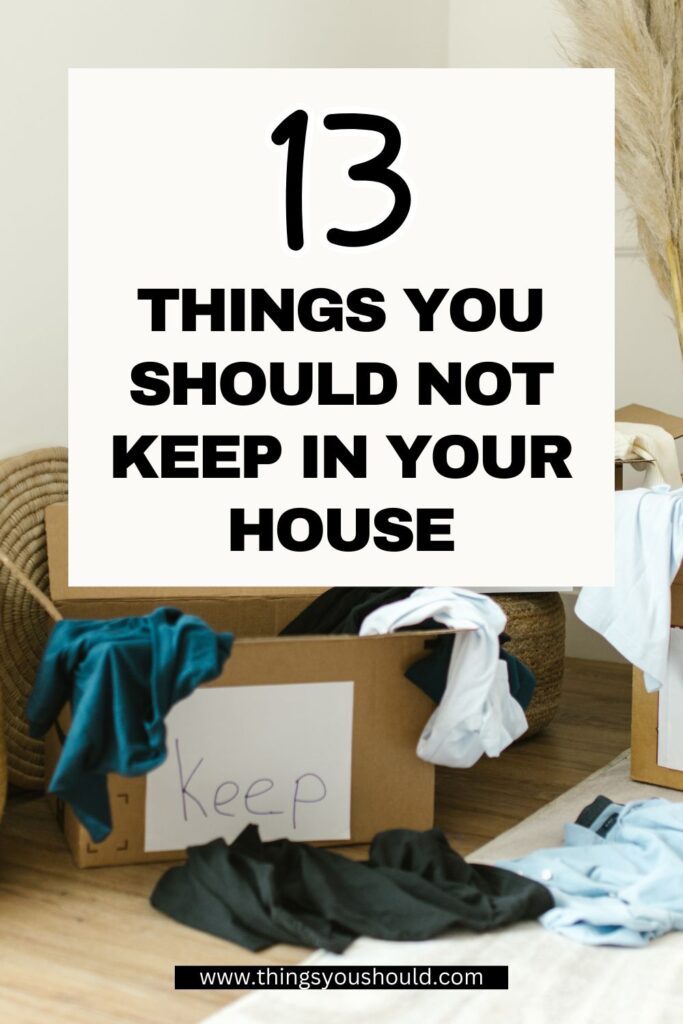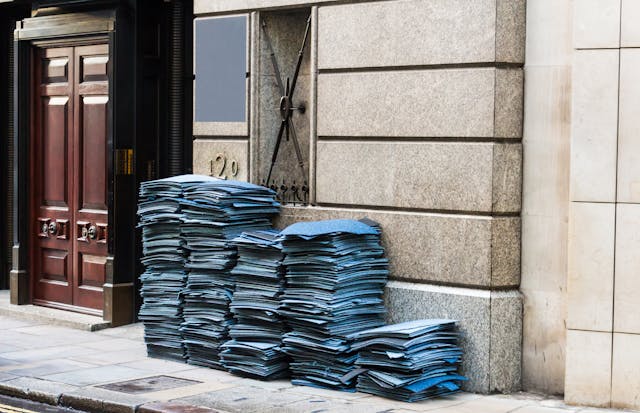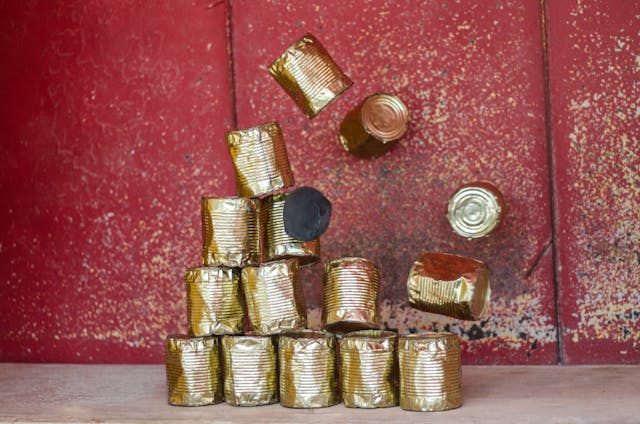When it comes to creating a safe and welcoming home environment, there are several things you should not keep in your house. While sentimental items are important, keeping unnecessary, expired, or potentially dangerous items can clutter your living space, reduce air quality, and even create safety hazards. In this article, we’ll cover the most important things you should remove from your home to make it a cleaner, safer, and more peaceful place to live.

1. Expired Medications
Why It’s Dangerous
Keeping expired medications is a common mistake, but it can be quite dangerous. Expired medications lose their potency and may not work as expected, posing serious health risks. In addition, some medications degrade into toxic compounds over time, posing a significant risk if ingested.
How to Properly Dispose of Expired Medicine
The best way to get rid of expired medications is to take them to a designated drop-off site or pharmacy. Flushing them down the toilet is generally not recommended, as they can contaminate the water supply.
2. Broken or Damaged Appliances
Potential Safety Hazards
Broken appliances are not only useless; they can also be dangerous. For example, a broken toaster can cause a fire, while a broken refrigerator can lead to spoiled food and health risks. Following the concept of ‘things you should not keep in your house’, it is important to discard items that are damaged or worn out, as they can pose a safety hazard or even attract pests.
Clutter and Mental Stress
Aside from the physical danger, keeping idle devices around can create clutter and lead to stress. Cluttered spaces are often associated with mental fatigue and anxiety, making it difficult to relax in your own home.

3. Old Magazines and Newspapers
Fire Hazard
Storing old newspapers and magazines may seem harmless, but they can quickly become a fire hazard. Paper is highly flammable and can burn easily, posing a threat to your home.
Attracting Pests
Piles of old paper are also a haven for pests such as silverfish and mice. These creatures thrive in dark, undisturbed areas, and once they become established in the home, they can be difficult to eradicate.

4. Outdated Electronics
E-Waste Concerns
Old electronics not only take up unnecessary space but also contribute to e-waste if disposed of improperly. E-waste contains harmful substances like lead and mercury which are toxic to the environment. Things you should not keep in your house include these old appliances, as they pose potential health hazards and create clutter that serves no practical purpose.
Recycle or Donate Them
Instead of letting these gadgets collect dust, you should recycle or donate them. Many organizations accept old electronics and either refurbish them for use or recycle their components in an environmentally friendly way.
5. Expired Food Items
Health Risks
Expired foods are one of the most dangerous things you should not keep in your home. Eating them can cause food poisoning, stomach problems and other health problems. It is important to regularly check expiration dates and get rid of items that are older than their expiration date.
How to Organize Your Pantry
To avoid piles of wasted food, try to organize your pantry effectively. Use a “first in, first out” method, where older items are placed in front, making sure they are used before newer items.

6. Toxic Cleaning Products
Environmental Impact
Many cleaning products contain harsh chemicals that can harm the environment if poured down the drain. These chemicals can reach waterways, harm aquatic life and contaminate our water supplies. According to the experts of ‘Things You Should not Keep in Your house’ it is important to avoid storing unnecessary hazardous items at home, as improper disposal of these items can increase environmental damage.
Safer Alternatives
Find Eco-friendly cleaning solutions that are efficient and safe for the environment. Natural cleaners such as vinegar, baking soda, and essential oils can often work well without harmful side effects.
7. Clothing You Never Wear
Causes of Closet Clutter
If you haven’t worn certain clothes in over a year, it’s time to break out. Keeping clothes you don’t wear creates unnecessary clutter in your closet, making it harder to find items you don’t use.
Benefits of Donation
Consider donating unused clothes instead of letting them take up space. Many people can benefit from gently used clothing, and you’ll free up space in your closet for the things you love.
8. Old Paint Cans
Dangers of Old Paint
Old paint cans, especially those with lead-based paint, are dangerous to keep around. Over time, paint can leak or dry out, releasing harmful fumes into the air or creating a fire hazard.

Proper Disposal Methods
Contact your local waste management service for instructions on how to dispose of paint cans safely. Many areas have hazardous waste collection sites specifically for items such as old paint. Which is listed among the things you should not keep in your home.
9. Stale or Torn Bedding
Hygiene Issues
Using torn or stale bedding is not only inconvenient, but it can also harbor dust mites, mold, and bacteria. These allergens can affect your respiratory health, especially for people with asthma or allergies.
Comfortable and Healthy Alternatives
Investing in fresh, high-quality bedding can improve your sleep quality and overall health. Consider changing your bedding frequently to maintain cleanliness.
10. Plastic Bags
Environmental Harm
Plastic bags are notorious for polluting our oceans and landfills. Even when reused, they have a limited shelf life and eventually leach into the environment, causing long-term damage.
Reusable Options
A more Eco-friendly option is to switch to reusable shopping bags made from cloth or biodegradable materials. You can keep some reusable bags in your car or near the door to make sure they’re ready for your next shopping trip. According to Things You Should Not Keep in Your House, decluttering your home and replacing single-use plastic bags with reusable ones can also contribute to a healthier, more organized living space.
11. Dead Plants
Bad Feng Shui
According to Feng Shui theory, dead plants bring negative energy to the house. They symbolize stagnation and decay, which can affect your mood and the overall energy of your space. As outlined in “Things You Should Not Keep in Your House,” items like dead plants should be removed to maintain a positive and harmonious environment.

Why You Should Replace Them
Replacing dead plants with fresh, vibrant greenery can improve your home’s ambiance and improve air quality. Live plants add a touch of nature and positivity to your living environment.
12. Unused Furniture
Wasted Space
According to Feng Shui theory, dead plants bring negative energy to the house. They symbolize stagnation and decay, which can affect your mood and the overall energy of your space. As outlined in “Things You Should Not Keep in Your House,” items like dead plants should be removed to maintain a positive and harmonious environment.
Donating or Re-purposing Ideas
Consider donating unused furniture to someone in need or re-purposing it for a different room in your home. You can find a new use for an old piece, bringing new life to your space.
13. Excess Paperwork
Organizing Your Documents
The extra paperwork is not only unnecessary clutter but also a potential security risk if sensitive documents are left lying around. Organize your important papers into a filing system and cross out anything that is no longer needed.
The Value of Going Paperless
Switching to a paperless system can significantly reduce the amount of clutter in your home. Many financial institutions and service providers offer paperless billing and statements, allowing you to manage everything digitally.
40 Things You Need for Your First Home Checklist
Conclusion
Finally, if you want to create a cleaner, safer, and more peaceful environment, there are several things you should not keep in your house. From expired medications and old electronics to dead plants and unused furniture, getting rid of these items can help you declutter, reduce risk, and improve your health. Start by assessing every room in your home and get rid of the things that no longer serve you.
FAQs
- How often should I declutter my house?
It’s a good idea to declutter every 6-12 months to keep your home organized and free of unnecessary items.
- What are some environmentally friendly ways to dispose of expired items?
Recycling, donating, and using designated drop-off locations for hazardous waste are great eco-friendly options.
- Can keeping old things in my home impact my mental health?
Yes, cluttered spaces can increase stress, and anxiety, and make it harder to focus.
- Is it safe to donate unused items like old electronics?
Yes, many organizations accept electronics for refurbishing or recycling. Make sure to wipe your data first.
- What should I do with broken or damaged furniture?
If repair isn’t possible, donate it or contact local services to help with proper disposal or recycling.